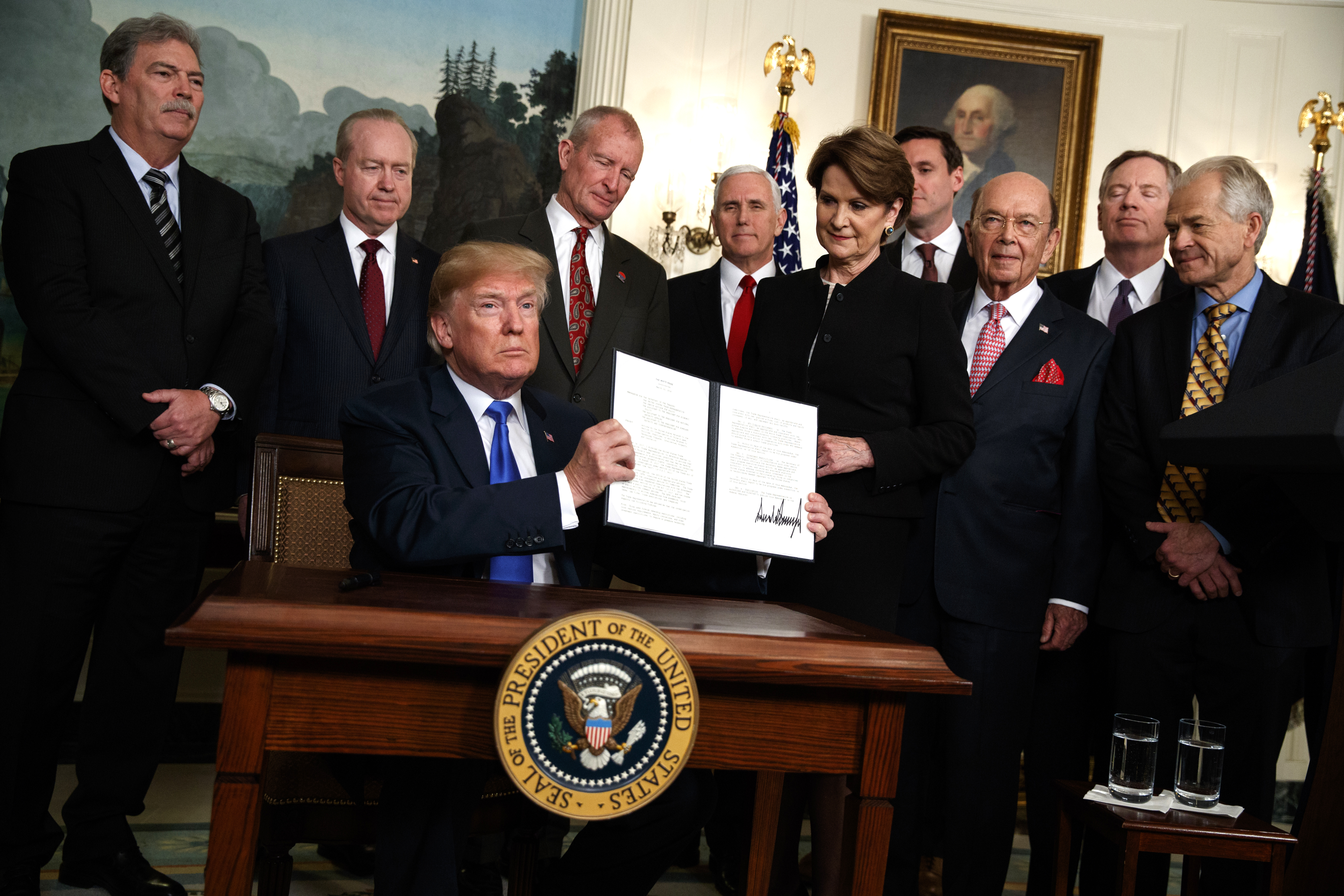How free traders inadvertently laid the groundwork for Trump's dumb trade war
If they want to know how we got into this mess, Trump's trade critics would do well to look in the mirror


President Trump is eager to start a trade war. And it's giving American elites heartburn. The Dow Jones Industrial Average plummeted 724 points Thursday — almost 3 percent — on the president's announcement that he will slap about $60 billion in tariffs on China. The S&P 500 fell 68 points, or 2.5 percent.
On top of Thursday's moves, Trump has already slapped tariffs on aluminum and steel imports, and he's aggressively renegotiating the North American Free Trade Agreement (NAFTA). Fears of an escalating trade feud between major nations abound among mainstream economists and politicians, especially from members of the president's own party. "We're on pins and needles," Rep. Erik Philip Paulsen (R-Minn.) told U.S. Trade Representative Robert Lighthizer on Wednesday.
These worries aren't exactly unfounded. But if they want to know how we got into this mess, Trump's trade critics would do well to look in the mirror.
The Week
Escape your echo chamber. Get the facts behind the news, plus analysis from multiple perspectives.

Sign up for The Week's Free Newsletters
From our morning news briefing to a weekly Good News Newsletter, get the best of The Week delivered directly to your inbox.
From our morning news briefing to a weekly Good News Newsletter, get the best of The Week delivered directly to your inbox.
It's hard to overstate how utterly dominant the globalized trade consensus was over the last few decades. Mainstream politicians and elites blithely defended it, even as ordinary Americans' anger at de-industrialization, offshoring, and job losses mounted. That paved the way for Trump's bull-in-the-china-shop routine.
The modern trade consensus began after World War II. American policymakers were eager to prevent another rise of nationalism. Knitting countries together in a web of international exchange seemed like a good strategy. "A peaceful world is possible only when there exists for it a solid economic foundation, an indispensable part of which is active and mutually beneficial trade among the nations," Secretary of State Cordell Hull observed in 1938.
At its start, free trade was not simply economic policy. It was a crusade, aimed at promoting liberalization, tolerance, and cosmopolitanism between nations.
And for a while, it worked.
A free daily email with the biggest news stories of the day – and the best features from TheWeek.com
Trade expansions in the mid-century, such as the General Agreement on Tariffs and Trade, concentrated on lowering tariffs and freeing up the flow of goods and services. In the post-war world, America's economic power was unrivaled, freeing it to export and share its wealth with a rebuilding Europe. Opening up to global trade held little risk for American workers. Not only did both the Democratic and Republican Parties come to support trade expansion, most unions supported it.
But from the 1970s onward, things took a decidedly pro-corporate turn.
The global poor and working class were on the rise, providing stiffer competition for American workers. Under pressure from U.S. diplomacy and international financial institutions, countries lowered barriers to capital flows as well. This freed up big companies to offshore, and shop the globe for the cheapest labor.
Modern trade deals like NAFTA, the Transatlantic Trade and Investment Partnership (TTIP), and the ill-fated Trans-Pacific Partnership focused on giving corporations everything they wanted: more intellectual property protection, fewer regulatory barriers, and even the ability to sue governments for sovereign decisions in court. Meanwhile, America turned towards a strong dollar policy and exorbitantly punished developing nations who built up high levels of debt. All of this served to inflate America's trade deficit and erode our manufacturing base.
The observation that free trade is a "win-win" for countries only works at the aggregate national level. How the rewards of trade are distributed among citizens is another matter entirely. Events like NAFTA and the entrance of China into the World Trade Organization helped destroy millions of well-paying middle-class jobs. Unions collapsed, wages stagnated, inequality soared, and communities across the Midwest and Rust Belt went into a state of near-permanent decline.
Meanwhile, politicians, economists, and commentators acted as if everyone was winning from free trade. If you criticized it, or suggested a return to protectionism, you were at best stupid, at worst immoral.
For example: Passage of the TPP became a hot issue in Congress in 2015, prompting a letter from former Council of Economic Advisers head Greg Mankiw and 13 other economists who'd held the post. They not only endorsed then-President Obama's fast-track authority to conclude the deal, but Mankiw took a decidedly supercilious tone. "Economists reach near unanimity on some topics, including international trade," he wrote, chalking opposition up to various irrational biases. "If Congress were to take an exam in Economics 101, would it pass?"
There was simply no room for politicians and policymakers to even acknowledge Americans' anger at modern trade. But the damage was real, and that anger wasn't going away. Eventually the pressure had to go somewhere. And if it couldn't find a constructive release, a destructive one would do.
Enter Donald Trump.
The president's unique combination of bluster and aggression was perfect for telling elites to take a hike. On the campaign trail, Trump railed against factory closures and offshoring, and promised to return jobs to the heartland. "NAFTA," he fumed, "is the worst trade deal maybe ever signed anywhere but certainly ever signed in this country." He won by flipping the entire Rust Belt to the GOP.
Unfortunately, Trump's temperament also makes for terrible policy substance.
The process that created the aluminum and steel tariffs was a haphazard joke. The ostensible national security logic behind them is brazenly dishonest. As for his China tariffs, the intellectual property theft justifying them are a real problem. But since it's unclear what China would need to do to get the tariffs removed, it has little incentive to change. In general, tariffs are a very unfocused, whack-a-mole tool for addressing trade deficits.
Meanwhile, Trump's attempt to renegotiate NAFTA will almost certainly go nowhere. It will merely produce red meat for his base, while annoying Canada and Mexico.
America could be using international diplomacy and new monetary policy tools to change the entire balance of international currency flows. It could take advantage of foreign hunger for U.S. assets to reinvest in domestic industries. It could be using tariffs in a strategic, targeted way, giving countries clear guidelines for how they need to shape up.
But Trump is a performance artist. He neither knows nor cares about substantive policymaking. Trump can only dynamite the global trade consensus, with unknown consequences to come. And elites can only look on in horror.
Yet it's difficult to feel much sympathy for them. This is, after all, a monster they helped create.
Jeff Spross was the economics and business correspondent at TheWeek.com. He was previously a reporter at ThinkProgress.
-
 How the ‘British FBI’ will work
How the ‘British FBI’ will workThe Explainer New National Police Service to focus on fighting terrorism, fraud and organised crime, freeing up local forces to tackle everyday offences
-
 The best family hotels in Europe
The best family hotels in EuropeThe Week Recommends Top kid-friendly hotels with clubs, crèches and fun activities for children of all ages – and some downtime for the grown-ups
-
 Moon dust has earthly elements thanks to a magnetic bridge
Moon dust has earthly elements thanks to a magnetic bridgeUnder the radar The substances could help supply a lunar base
